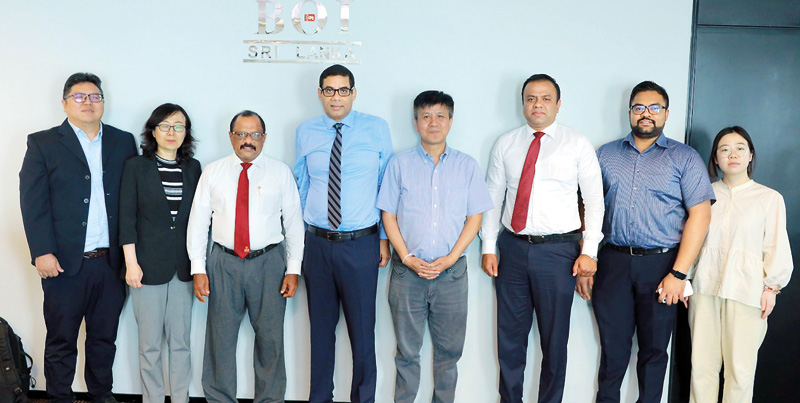Tuesday Feb 24, 2026
Tuesday Feb 24, 2026
Friday, 15 December 2023 00:25 - - {{hitsCtrl.values.hits}}

The Chinese Academy of Sciences (CAS) and the BOI recently concluded a series of meetings and fact-finding visits to BOI zones to seek new opportunities for fruitful long-term bilateral relationships.
The NetZero commitment of the nations and industries and sustainable strategic planning of the BOI has paved the way to develop its zone’s management to attract green and digital FDIs to the country as it is evident that Sri Lanka needs world-class collaborators to reach these significant strategically important key measurements. Therefore, the CAS’ world view and vision of collaboration with the nation and its mission of research and innovation and further developing a merit-based learning ecosystem would enable the BOI to leapfrog the process of developing a greener and sustainable zones management system. In the context of the near future, both parties look forward to working together and developing a synergistic relationship.
The Chinese Academy of Science has a mandate to explore and harness high technology and the natural sciences for the benefit of China and the world. Comprising a comprehensive research and development network, a merit-based learned society, and a system of higher education, CAS brings together scientists and engineers from China and around the world to address both theoretical and applied problems using world-class scientific and management approaches.
CAS has further defined its development strategy by emphasising greater reliance on democratic management, openness, and talent in the promotion of innovative research. The academy aims for a bright future as one of the world’s top S&T research and development organisations.
Drawing from the BOI›s previous insightful discussions with CAS, it has identified several pivotal activities that would constitute the foundation of fruitful collaboration. These activities hold inherent advantages that align harmoniously with our shared goals and finally reach a Memorandum of Understanding (MoU) between CAS and BOI. At the meeting CAS will support the BOI in fulfilling the undermentioned projects:
Following the National Determined Contributions (NDCs), BOI is committed to consulting with CAS to craft an integrated eco-industrial park concept. By aligning our strategies with sustainable practices, we will bolster the park›s environmental footprint and play an active role in fulfilling national sustainability objectives
Ensure the highest standards of water quality, BOI envisioned creating a specialised facility dedicated to testing the drinking water quality and treated water quality of BOI enterprises. This could involve the establishment of a fully equipped water quality laboratory on the premises of the Kandy Industrial Park
Undertake the establishment of a pilot model Membrane Bioreactor (MBR) treatment plant for pharmaceutical effluent. This visionary initiative would serve as a practical testing ground, potentially revolutionising wastewater treatment practices in the pharmaceutical sector and enabling opportunities to enhance the capacity of existing pharmaceutical manufacturing as the location is demarcated as a sensitive area.
These programs offer comprehensive insights into water technology, environmental management, and sustainable practices. Empowering BOI staff and enterprises, these initiatives would enable them to address industry-specific challenges effectively.
An ambitious undertaking involves applying the Zero Liquid Discharge (ZLD) concept to the BOI industries in the context of Pharmaceutical and life sciences manufacturing sectors initially. It exemplifies our commitment to advance environmentally responsible manufacturing processes.
Water Quality Monitoring in treated Wastewater and Research in the Mahaweli River basin around the Kandy Industrial Park
Through extensive research, we seek to enhance water quality in the Mahaweli River basin. Dedication to this cause is rooted in our vision for a healthier environment and a more sustainable future, the establishment of an online water quality monitoring system for river water quality monitoring stations. As a model project the latter will expand to other zones with integrated water quality monitoring systems for wastewater treatment plants.
By exposing them to real-world industrial practices within the park, BOI aims to nurture young talents and provide them with practical insights. Additionally, this would pave the way for research programs closely supervised by BOI and CAS experts. This academic-industry fusion would offer students the chance to explore cutting-edge research initiatives and contribute directly to sustainable advancements.